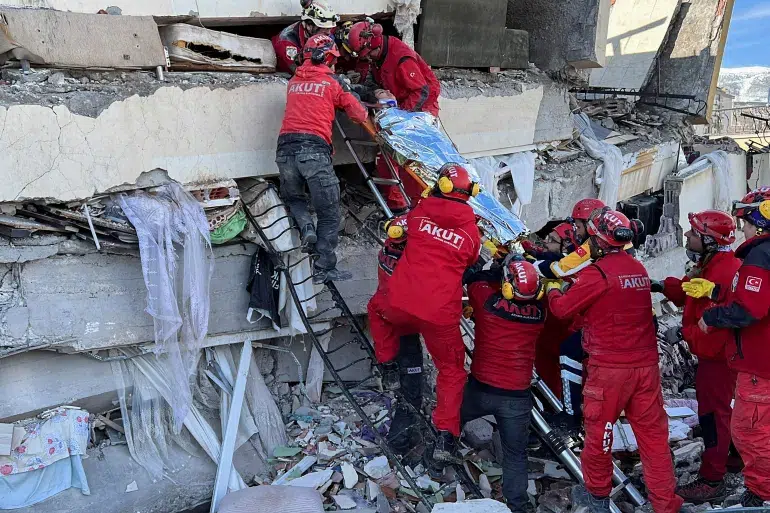World News
Read Details As Death Toll Rises To 15,000 In Turkey-Syria Earthquake

The death toll from the massive earthquake that struck Turkey and Syria on Monday climbed above 15,000 by Wednesday, according to authorities, as rescuers raced to save survivors trapped under debris in freezing weather.
Officials and medics said 12,391 people had died in Turkey and 2,992 in Syria from Monday’s 7.8-magnitude tremor, bringing the confirmed total to 15,383. Tens of thousands more were injured.
Rescue teams in Turkey and Syria have been searching for signs of life from an untold number of people trapped in the rubble. Teams from more than two dozen countries, including Israel, have joined tens of thousands of local emergency personnel in the effort.
But the scale of destruction from the quake and its powerful aftershocks was so immense and spread over such a wide area that many people were still awaiting help.
Experts said the survival window for those trapped under the rubble or otherwise unable to obtain basic necessities was closing rapidly. At the same time, they said it was too soon to abandon hope.
“The first 72 hours are considered to be critical,” said Steven Godby, a natural hazards expert at Nottingham Trent University in England. “The survival ratio on average within 24 hours is 74%, after 72 hours it is 22% and by the fifth day it is 6%.”
Read Details As Death Toll Rises To 15,000 In Turkey-Syria Earthquake
Rescuers at times used excavators or picked gingerly through debris. It was not clear how many people might still be trapped.
Stories of rescues continued to provide hope that some people still trapped might be found alive.
A crying newborn still connected by the umbilical cord to her deceased mother was rescued Monday in Syria.
In Turkey’s Kahramanmaras, rescuers pulled a three-year-old boy from the rubble, and teams sent by the Israeli military saved at least four people, including a two-year-old boy.
But David Alexander, a professor of emergency planning and management at University College London, said data from past earthquakes suggested the likelihood of survival was now slim, particularly for seriously injured individuals.
“Statistically, today is the day when we’re going to stop finding people,” he said on Wednesday. “That doesn’t mean we should stop searching.”
Alexander cautioned that the final death toll may not be known for weeks because of the sheer amount of rubble.
The earthquake’s toll has already outstripped that of a 7.8-magnitude quake in Nepal in 2015 when 8,800 died. A 2011 earthquake in Japan triggered a tsunami, killing nearly 20,000 people.
Many of those who survived this week’s quake lost their homes and were forced to sleep in cars, government shelters, or outdoors amid rain and snowfall in some areas.
“We don’t have a tent, we don’t have a heating stove, we don’t have anything. Our children are in bad shape,” Aysan Kurt, 27, said. “We did not die from hunger or the earthquake, but we will die freezing from the cold.”
Temperatures in the quake-stricken Turkish city of Gaziantep plunged to minus five degrees Celsius early Thursday but thousands of families spent the night in cars and makeshift tents — too scared or banned from returning to their homes.
Parents walked the streets of the city carrying their children in blankets because it was warmer than sitting in a tent.
“When we sit down, it is painful, and I fear for anyone who is trapped under the rubble in this,” said Melek Halici, who wrapped her two-year-old daughter in a blanket as they watched rescuers working late into the night.
“Eventually we will have to go to the tent, but I don’t want to,” she added. “I can’t bear the cold, but nor can I think about going back to our apartment.”
City authorities have barred thousands of residents from going back to apartment blocks that are considered at risk from aftershocks shaking the region each day.
BY IYABO AINA
Publisher News Rain Nigeria














